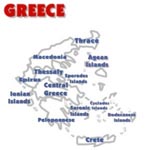Crete farmers clash with riot police at Greek port
 Athens - Greek riot police fired tear gas and clashed with protesting farmers at the port of Piraeus for a second day Tuesday after farmers attempted to break through a police barricade.
Athens - Greek riot police fired tear gas and clashed with protesting farmers at the port of Piraeus for a second day Tuesday after farmers attempted to break through a police barricade.
More than 2,000 farmers from the Greek Mediterranean island of Crete remained camped out at Piraeus, the main port on the mainland, throughout Tuesday.
Hundreds more had joined them after arriving on passenger ferries early Tuesday to protest low commodity prices and demand fresh subsidies.
Large parts of Greece's busiest harbour remained closed off to traffic due to the clashes. All vessels to and from Crete remained anchored.
Farmers, many dressed in traditional black shirts and carrying mountain canes could be seen hurling tomatoes and potatoes at riot police, who sprayed tear gas into the crowds.
On Monday, police fired tear gas to stop farmers from taking their tractors and farm vehicles through the Greek capital to the Ministry of Development.
Officials in Athens said they would only allow demonstrators to arrive by foot.
Deputy finance and agriculture ministers met with farmers late on Monday in an effort to convince them to return home, but failed to reach agreement.
Greek farmers have been protesting for the past two weeks over low prices for their products and are demanding financial help from the conservative government.
They have used their tractors to block major highways across the country, and have prevented imports and exports across many of the country's northern borders, particularly with Bulgaria.
Greek businesses said the strike, which comes shortly after youth riots in late 2008, has cost millions of euros in lost revenue.
Many of the roadblocks were lifted after farmers accepted a 500- million-euro emergency aid package from the government - which has yet to be approved by the European Union.
The farmers are demanding tax rebates and subsidies from the government in the wake of falling prices for their goods and sinking EU subsidies. They estimate that their income levels have declined by 25 per cent in the past ten years.
The government of Prime Minister Costas Karamanlis has said the current financial crisis leaves it no room to offer further help. (dpa)